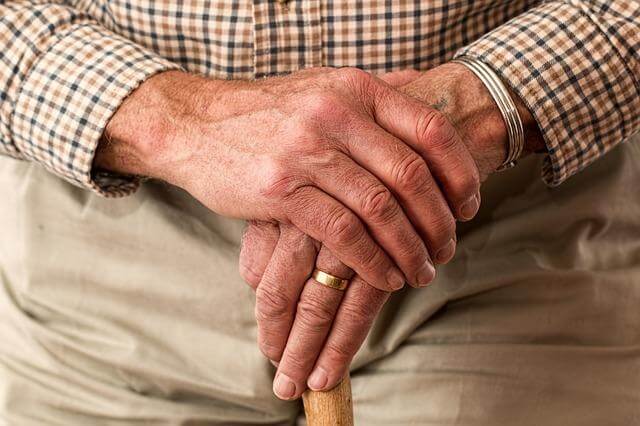The University of Texas Health Science Center at San Antonio (UT Health San Antonio) has been designated a Parkinson’s Foundation Comprehensive Care Center, the first of its kind in the state of Texas.
The Parkinson’s Foundation announced the expansion of its Global Care Network with the addition of four Centers of Excellence and four Comprehensive Care Centers, the latter category including UT Health San Antonio. The expansion recognizes centers that are providing excellent care to people with Parkinson’s disease within a broad geographic region.
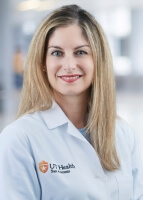
“Our center offers patients a specialized team of neurologists, movement disorder specialists, physical and occupational therapists, mental health professionals and others,” said Okeanis Vaou, MD, associate professor and director of the movement disorders program in the Department of Neurology, Joe R. and Teresa Lozano Long School of Medicine. “Our team is up to date on the latest Parkinson’s disease medications, therapies and research to provide the best care.
“Each Parkinson’s Foundation Comprehensive Care Center is required to meet rigorous care, professional training, community education and outreach criteria,” Vaou continued. “We are honored to receive this recognition and are proud to offer our expertise to the people of San Antonio and South Texas.”
The movement disorders program includes three fellowship-trained movement disorders neurologists who see patients of the UT Health Physicians neurology practice. They are:
- Okeanis Eleni Vaou, MD, associate professor and movement disorders program director; specialties: deep brain stimulation and sleep medicine
-
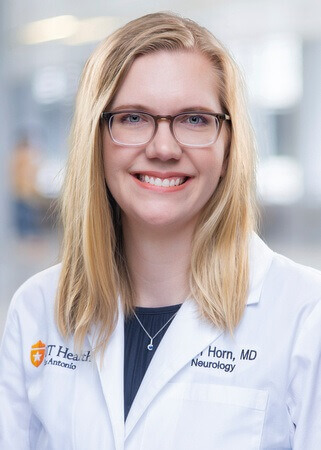
Sarah Horn, MD Sarah Horn, MD, assistant professor who occupies the Maj. Gen. Ret. Joe and Patty Robles Professorship in Parkinson’s disease; specialties: treatment of Parkinson’s dementia, treatment of hallucinations, deep brain stimulation
- Pablo Coss, MD, assistant professor; specialties: Huntington’s disease (he leads the team’s Huntington’s Disease Center of Excellence), deep brain stimulation
The number of people living with Parkinson’s disease in the U.S. is expected to rise to 1.2 million by 2030. A central priority of the Parkinson’s Foundation is to ensure that all people with the disease can obtain the care and support they need to improve their health and quality of life.
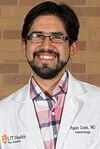
“The newly designated centers join a network that is setting the highest standard of care for people with Parkinson’s in the U.S. and internationally,” said John L. Lehr, president and CEO of the Parkinson’s Foundation. “With our latest Global Care Network expansion, we are proud to further our commitment to improving the health and quality of life for people with Parkinson’s by recognizing providers offering exceptional care in their communities.”
Vaou, fellowship-trained in movement disorders and in sleep medicine, joined UT Health San Antonio in September 2022. She discussed what the movement disorders program offers South and Central Texas patients.
“UT Health San Antonio is the only academic movement disorders center in the San Antonio area,” Vaou said. “We treat Parkinson’s disease, essential tremor, dystonias, Huntington’s disease, Tic Disorders and other disorders. Therapies include botulinum toxin (Botox) injections, medications and deep brain simulation, which is surgical therapy for Parkinson’s, dystonias and essential tremor.”
The movement disorders program is involved in clinical research studies of:
- Medications to control tremor.
- Genetic causes of Parkinson’s disease.
- Medications to delay disease progression.
- Medications to prevent bone fractures from falls.
- Medications used in hallucinations and Parkinson’s dementia, and many more.
“We are enrolling for these and more clinical trials ready start later this year,” Vaou said.
To see a physician of the center, call 210-450-9700. To inquire about clinical trials, call 210-450-8830.
The movement disorders program features a strong multidisciplinary team of physical therapists, occupational therapists, speech pathologists, inpatient and outpatient rehabilitation medicine specialists, neuropsychologists, social workers, and genetic counselors for evaluation and counseling.
The center also provides a movement disorders fellowship to train new movement disorder specialists coming out of their neurology residency programs. Horn is the fellowship director.
The UT Health San Antonio Movement Disorders Center is also recognized as a Huntington’s Disease Center of Excellence and provides comprehensive care for patients with Huntington’s disease.
Deep brain stimulation (DBS)
DBS was approved for treatment of Parkinson’s disease in 2002. “We have tremendous knowledge compared to what we did back 10 years ago,” Vaou said.
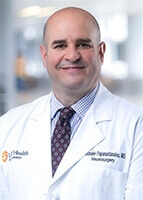
The movement disorders program collaborates with Alexander Papanastassiou, MD, associate professor of neurosurgery in the Long School of Medicine. After extensive preoperative planning to pinpoint sites of the brain where DBS is needed, surgery is performed at UT Health San Antonio’s clinical partner, University Hospital. Papanastassiou implants DBS electrodes in the exact locations in the brain.
Entry is gained through two dime-sized holes. The surgery is minimally invasive to enhance rapid recovery with the least pain, blood loss, hospital time and recovery. Depending on the patient’s hairline, the only external mark may be a little bump on the skin.
“DBS is an advanced therapy for patients with Parkinson’s disease and other movement disorders, and the last five years have provided several leaps in technology,” Vaou said. “It’s kind of like the smartphones that keep on upgrading. We can steer the stimulation precisely and collect patient information for a more personalized and focused therapy.
“When the patient comes in, we can analyze their recordings over days, weeks and months, and we have an electronic diary of their movement symptoms,” Vaou said. “With that, we understand their symptoms better and adjust their therapy settings, which allows for customized, individualized treatment.
Previously, DBS was programmed based on the patient’s memory and narrative of symptoms. “But now we have objective data,” Vaou said.
5-year certification
Every Parkinson’s Foundation Comprehensive Care Center must recertify after five years to ensure requisite standards of care.


